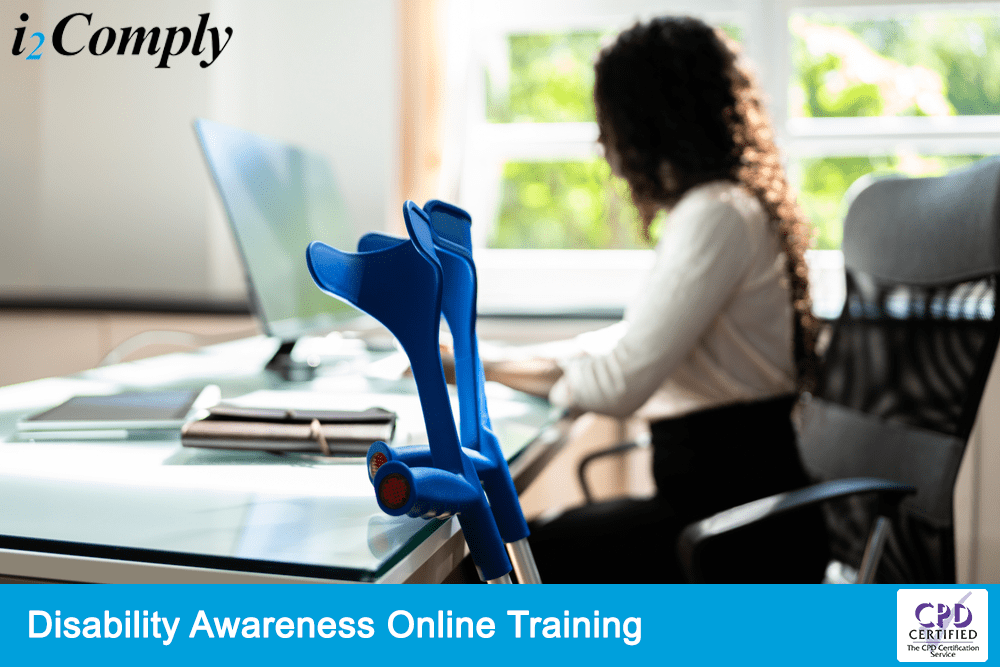In the UK, 23% of working-age adults have a disability, and the number is rising. Consequently, there are more people with a disability in employment every year. The latest report on employment of disabled people published by the Department for Work and Pensions, reveals that the number of disabled people in employment has increased from 2.9 million in 2013 to 5.1 million in 2023. That is an increase of 77.2%.
People with a disability represent a significant proportion of the UK’s workforce and consumer community. Inevitably, some of your customers and colleagues will have disabilities. Therefore, it is important that managers and staff are confident when managing and working with disabled people and understand disabled customers’ needs.
This article explains the benefits of disability inclusion in the workplace and how disability awareness training can help create a more inclusive workplace.
Benefits of disability inclusion

Disability inclusion can benefit your workplace in several ways:
1. Access to a wider pool of talent
Nearly one in four working-age people in the UK has a disability. If an organisation considers disabled candidates when they are recruiting, they attract a wider talent pool.
Organisations that promote disability inclusion, and adjust their recruitment processes for people with disabilities, encourage more individuals with disabilities to apply for a position, increasing their candidate pool. Companies without a disability-friendly recruitment process could be missing out on talented individuals who would be an asset to their business.
Many people with disabilities are resilient as they have had to overcome barriers and have acquired transferable skills from these experiences, such as persistence, forethought, problem-solving and adaptability. This can make them proactive, innovative, and a valuable asset to your company.
2. Increased engagement and retention
Building an inclusive workplace is not just about hiring people with disabilities. It also involves developing long-term strategies to create an environment where people with disabilities can succeed.
When an organisation demonstrates that it treats all employees fairly, it will improve employee morale and commitment. Therefore, employees will be more dedicated and less likely to leave their job. As a result, staff productivity and retention will increase, and turnover rates will fall.
3. Protects against large fines and reputational damage
Companies must comply with the Equality Act 2010. The Equality Act 2010 replaced the Disability Discrimination Act 1995 and 2005 (DDA) and makes it unlawful to discriminate against, harass or victimise a person with a disability. The Act requires employers to make reasonable adjustments to support disabled job applicants and employees. It is not acceptable to exclude people who need reasonable accommodations from a job. Disability inclusion helps to ensure that your company remains compliant and protects against hefty fines & reputational damage resulting from non-compliance.
4. Improves products, services and reputation
Most organisations have disabled customers. An inclusive workplace will be better placed to understand its customers’ needs. Hiring candidates with disabilities will help you to ensure that the goods and services you produce are inclusive of people with disabilities.
Also, by having a better understanding of the barriers that people with disabilities face, staff will be better able to help customers with a variety of needs and accessibility requirements. This will demonstrate that your business is accessible for everyone.
Making customers aware that disability inclusion and equality are part of your company’s values can have a major impact on your reputation. Customers are more likely to be loyal to businesses that demonstrate good values.
How can disability training help?

So, how does disability awareness training help you to create a more inclusive workplace?
Builds staff awareness
Firstly, relevant training helps to build awareness about different types of disabilities and the challenges that people living with disabilities may face. People who don’t have a disability, and don’t know any disabled people, can be unaware of the problems that disabled people face daily. People with a disability are more likely to be discriminated against due to stigma, miseducation, and fear. This leads to microaggressions and unconscious bias both in the workplace and outside work.
Challenges common myths and stereotypes about disability
Disability awareness training challenges common myths and stereotypes about disability to help create a more positive view of disability. This will help to change your colleagues’ attitudes towards disabilities and help those with disabilities feel more understood by their peers, who may have little or no knowledge of disabilities.
Identifies ways to accommodate staff with disabilities
Rather than solely focusing on raising awareness of disabilities, reputable training can also provides guidance on how to be more inclusive of people with disabilities. Training can cover disability etiquette, how language can be harmful even when well-intentioned, and guidelines for appropriate and respectful language relating to disability. It can explain the need to make adjustments for disabled people and identify ways to accommodate disabled team members and ensure that recruitment processes are accessible to all.
Be more accessible
Finally, training explains why making your products and services easy to use for everyone is important. Thinking in terms of how can we reach as wide an audience as possible. It is not only about making your services more accessible, but ways your organisation can improve the accessibility of company emails, presentations, and documents.
Need disability awareness training for your staff?
Our Disability Awareness training course provides a good level of knowledge that will help you to gain a better understanding of disabilities. It describes relevant UK laws and explains important elements of an inclusive workplace.
Click on the link to learn more about our CPD-certified online Disability Awareness Training .




